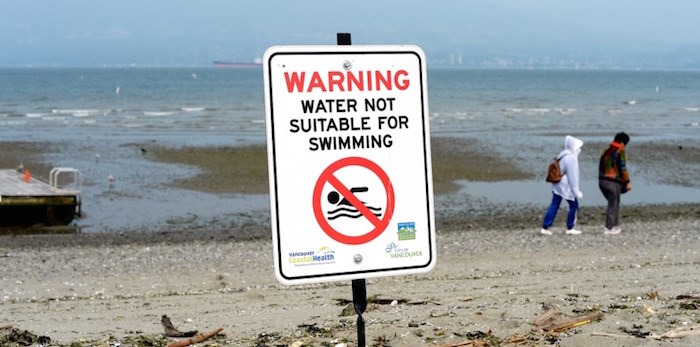Three Vancouver beaches remain closed to swimming Monday after high levels of E. coli were detected in the water late last week.
 Signs advising people to stay out of the water went up at Jericho Beach, as well as English Bay and Sunset beaches, over the weekend after high levels of E. coli were detected in the water. Photo Jennifer Gauthier
Signs advising people to stay out of the water went up at Jericho Beach, as well as English Bay and Sunset beaches, over the weekend after high levels of E. coli were detected in the water. Photo Jennifer Gauthier
Vancouver Coastal Health over the weekend issued swimming advisories for English Bay, Sunset and Jericho beaches due to high levels of E. coli bacteria found in the water in samples taken late last week. This is the second time this summer an advisory has been issued for Sunset Beach. It, along with Kits Beach, was closed to swimming on July 28. That advisory was lifted by Aug. 3.
Trout Lake has been closed to swimming and wading since July 19.
Metro Vancouver beaches are monitored weekly from May to September to ensure that water quality meets the Canadian Recreational Water Quality guidelines, which recommend an E. coli level of no more than 200 bacteria per 100 millilitres of water.
 A mostly deserted Jericho Beach Monday afternoon. Vancouver Coastal Health issued a swimming advisory for Jericho, English Bay and Sunset beaches over the weekend after higher than normal levels of E. coli were detected. Photo Jennifer Gauthier
A mostly deserted Jericho Beach Monday afternoon. Vancouver Coastal Health issued a swimming advisory for Jericho, English Bay and Sunset beaches over the weekend after higher than normal levels of E. coli were detected. Photo Jennifer Gauthier
Dr. James Lu, medical health officer at Vancouver Coastal Health, said the water quality is measured in two ways — by monitoring the monthly average and by looking at the individual samples. In the case of Jericho, he said, the monthly average is fairly low however a test sample taken last Thursday came back with an E. coli reading of more than 400. Lu said in a case like that, a second sample is taken the next day. If the results of the second sample are also higher than 400, an advisory is issued.
He added that Metro Vancouver is taking water samples from all three beaches again today and the health authority should have the results some time tomorrow.
As for the cause, Lu said it’s difficult to pinpoint.
“It’s not really clear,” he said. “There’s probably a lot of different factors.”
He said it could be due to an increase in boat traffic, and boats emptying sewage into the water, as well as more people brining pets to the beach. As well, warmer temperatures in recent weeks can also mean more bacteria growth in the water.
“There are many different factors that I think would contribute to this,” Lu said.
It is illegal to dump untreated sewage in the water around Vancouver. The Burrard and Heather civic marinas offer free pump out services. And Vancouver Park Board also offers a free mobile pump out service during summer months.
Lu said it’s just been in the last few years that water quality has become an issue at Vancouver beaches, adding that beach water quality had been “pretty good” until the last two to three years. A lifeguard at Jericho Beach told the Courier Monday that this is the first time in 33 years that beach has been closed to swimming.
Lu added that the beaches are still open, the health authority is just recommending that people stay out of the water.
The higher levels of E. coli increase the risk of gastro-intestinal illness in people that come into contact with the water. Symptoms of E. coli-related illness include nausea, vomiting, stomach cramps and diarrhea.
With files from John Kurucz



